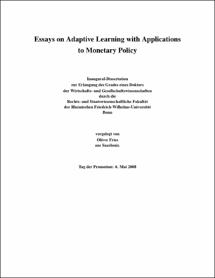Essays on Adaptive Learning with Applications to Monetary Policy


| dc.contributor.advisor | von Hagen, Jürgen | |
| dc.contributor.author | Fries, Oliver | |
| dc.date.accessioned | 2020-04-11T18:46:17Z | |
| dc.date.available | 2020-04-11T18:46:17Z | |
| dc.date.issued | 2008 | |
| dc.identifier.uri | https://hdl.handle.net/20.500.11811/3316 | |
| dc.description.abstract | While the concept of rational expectations has become the standard tool of modellingexpectations in macroeconomic models, it has been criticised for its high information and rationality requirements. Moreover, rational expectations is an equilibrium concept which does not answer the question how the equilibrium can be reached. As a consequence there has been an increasing interest in learning theory in economics in recent years. This thesis focuses on a particular concept of learning which is called adaptive learning. Rational expectations are often criticised to require too much information on part of the economic agents. It is assumed that they know the structure of the economy, the history of all endogenous and exogenous variables and all parameter values. The literature on adaptive learning reduces these informational requirements. The agents are still assumed to know the history of all variables. It is also assumed that they are endowed with some model of the economy which they use to forecast the future path of the endogenous variables. This forecasting model can be a an arbitrary function of past endogenous and past and current exogenous variables. In the literature it is usually referred to as the perceived law of motion of the economy. Unlike under rational expectations the agents do not know the correct values of their perceived law of motion. Instead they try to infer these parameters from the data they observe using some learning algorithm. Popular adaptive learning algorithms include recursive least squares and stochastic gradient learning. Given some estimates for the perceived law of motion the agents use the perceived law of motion to forecast the future path of the endogenous variables. These expectations together with the history of endogenous and exogenous variables determine the actual law of motion of the economy. Subsequently a new set of exogenous variables realises. The new realisation of endogenous and exogenous variables enables the agents to update the estimates for their perceived law of motion and the process starts all over. Under certain conditions on the structure of the economy and the perceived law of motion the forecasts of the agents converge towards rational expectations. This thesis contributes to three related branches of the literature. The first investigates the conditions under which convergence occurs. Once we know these conditions we can investigate whether the design of monetary or fiscal policy has an impact on the convergence of adaptive learning. Finally, adaptive learning may be used to explain empirical observations which are difficult to reconcile with rational expectations. | en |
| dc.language.iso | eng | |
| dc.rights | In Copyright | |
| dc.rights.uri | http://rightsstatements.org/vocab/InC/1.0/ | |
| dc.subject | Adaptive Learning | |
| dc.subject | E-Stability | |
| dc.subject | Fiscal Theory of the Price Level | |
| dc.subject | Sunspots | |
| dc.subject | Great Moderation | |
| dc.subject | Adaptives Lernen | |
| dc.subject.ddc | 330 Wirtschaft | |
| dc.title | Essays on Adaptive Learning with Applications to Monetary Policy | |
| dc.type | Dissertation oder Habilitation | |
| dc.publisher.name | Universitäts- und Landesbibliothek Bonn | |
| dc.publisher.location | Bonn | |
| dc.rights.accessRights | openAccess | |
| dc.identifier.urn | https://nbn-resolving.org/urn:nbn:de:hbz:5-14151 | |
| ulbbn.pubtype | Erstveröffentlichung | |
| ulbbnediss.affiliation.name | Rheinische Friedrich-Wilhelms-Universität Bonn | |
| ulbbnediss.affiliation.location | Bonn | |
| ulbbnediss.thesis.level | Dissertation | |
| ulbbnediss.dissID | 1415 | |
| ulbbnediss.date.accepted | 06.05.2008 | |
| ulbbnediss.fakultaet | Rechts- und Staatswissenschaftliche Fakultät | |
| dc.contributor.coReferee | Linnemann, Ludger |
Dateien zu dieser Ressource
Das Dokument erscheint in:
-
E-Dissertationen (288)




